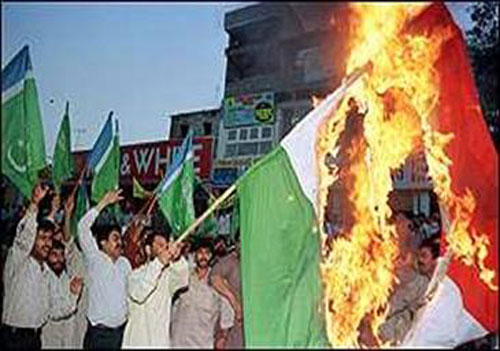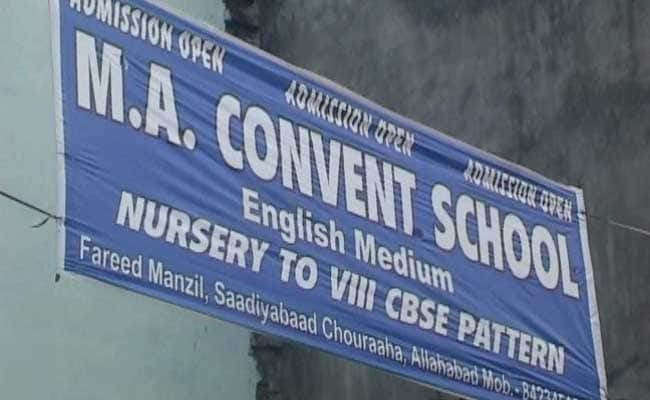People of any nation irrespective of their caste,creed,sex,region,religion will take pride in the country's national symbols,national song,national anthem etc. Citizens patriotism increase the moment they hear about their country's rich tradition,culture and sing with pride standing up showing gratitude to their mother land.

But many in India are now left to wonder whether standingup, singing the national anthem or national song, showing respect to national symbols a national shame. During the days of freedom struggle, freedom fighters and national leaders raised slogans like Vande Mataram, Bharat Mata Ki Jai etc and sang Vande Mataram with lot of pride and patriotism.

But as differences arose, many vested interests started opposing national anthem and national song. Already people stopped singing national song Vande Mataram penned by Bankim Chandra Chatopadhyaya and now many started opposing singing of national anthem Jana Gana Mana penned by Rabindranath Tagore.

Now in a shocker a school in Uttar Pradesh refused to sing national anthem on Independence Day. Zia-ul Haq, manager of MA Convent School in Baghara locality claimed that 'Bharat Bhagya Vidhata' violated the basic tenets of Islam. The school till now never celebrated Independence Day and sang the national anthem. Haq went on to say "only Allah can be the Bhagya Vidhata, which means the one who decides our destiny. How can we call Bharat our Bhagya Vidhata?"
Muslims raised objections on Vande Mataram saying they cannot sing praises of mother land as their religion do not permit. No one even remember the full song of Vande Mataram. Now they are refusing to say Bharat Mata Ki Jai on similar lines. In the recent past many witnessed burning of national flag, Indian tri color in Kashmir and other parts.
Some even mistake the colors saffron and Green in the national flag as that of symbolising Hindu and Muslim religions. Now many stopped getting up while national anthem is getting played and when questioned, they call it right to freedom of expression,democracy etc. But they fail to understand that in the guise of democracy and freedom of speech, one can not insult national flag,national anthem, national symbols.

Rabindranath Tagore opposed Vande Mataram as national anthem and he wrote a letter to Subhash Chandra Bose saying "The core of Vande Mataram is a hymn to goddess Durga: this is so plain that there can be no debate about it. Of course Bankimchandra does show Durga to be inseparably united with Bengal in the end, but no Mussulman [Muslim] can be expected patriotically to worship the ten-handed deity as "Swadesh" [the nation]. This year many of the special [Durga] Puja numbers of our magazines have quoted verses from Vande Mataram—proof that the editors take the song to be a hymn to Durga. The novel Anandamath is a work of literature, and so the song is appropriate in it. But Parliament is a place of union for all religious groups, and there the song cannot be appropriate. When Bengali Mussulmans show signs of stubborn fanaticism, we regard these as intolerable. When we too copy them and make unreasonable demands, it will be self-defeating."
He went on to add "Bengali Hindus have become agitated over this matter, but it does not concern only Hindus. Since there are strong feelings on both sides, a balanced judgment is essential. In pursuit of our political aims we want peace, unity and good will—we do not want the endless tug of war that comes from supporting the demands of one faction over the other"

After debate Congress then adopted only the first two stanzas as national song. Even Rabindranath Tagore's Jana Gana Mana is not far from controversies. For quite sometime many accused Tagore of writing Jana Gana Mana to please British King George V. Many say words in the national anthem Jana Gana Mana like "Adhinayak","Bharat Bhagya Vidhata" refer to King George V who was the ruler of the country during 1911. The song was first sung at on the second day of the Calcutta Conference of the Congress party in December 1911. This conference was held specially to give a loyal welcome to King George the fifth, and to thank him for annulling the Partition of Bengal in 1905.
But others in support of Rabindranath Tagore say the song was wrtitten first in 1908 in Bengali before Geetanjali and after he finished Kheya. He wrote near a place in Shantiniketan. They argue that Tagore wrote the song two years before King George V didnot even think of coming to India. Tagore himself said "I should only insult myself if I cared to answer those who consider me capable of such unbounded stupidity" When Tagore's friend who was loyal to King George V asked him to write song praising the king, Tagore remarked angrily. Even Subash Chandra bose adopted it as National Anthem for Azad Hind Fauj.
Right thinking people however say silly controversies on national symbols,national anthem and national song divide the country on communal lines and people should expose these vested interests.































